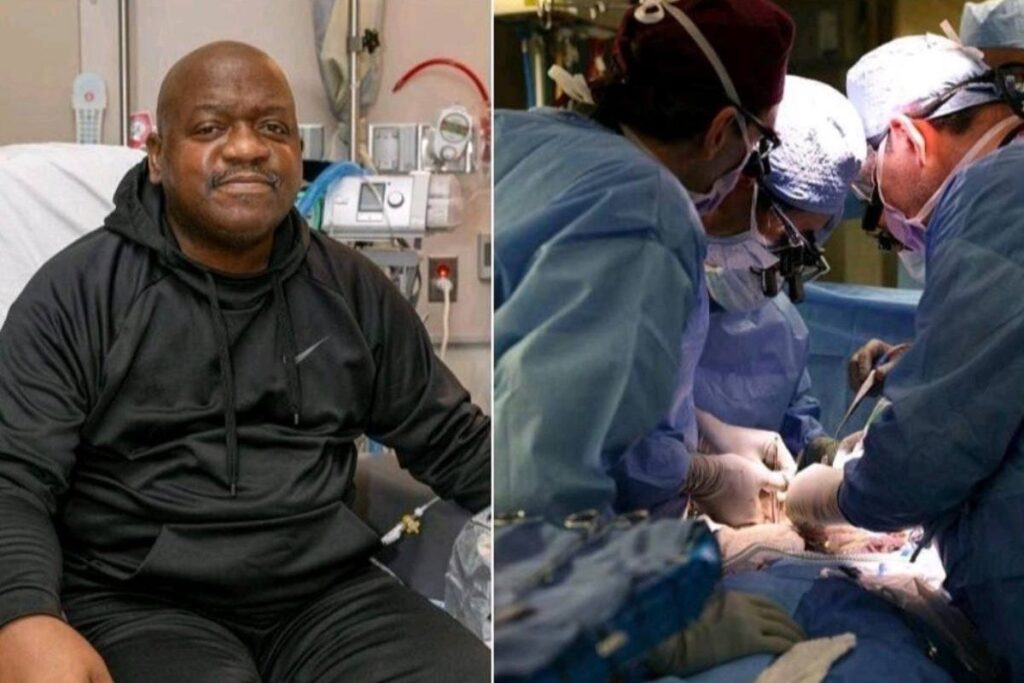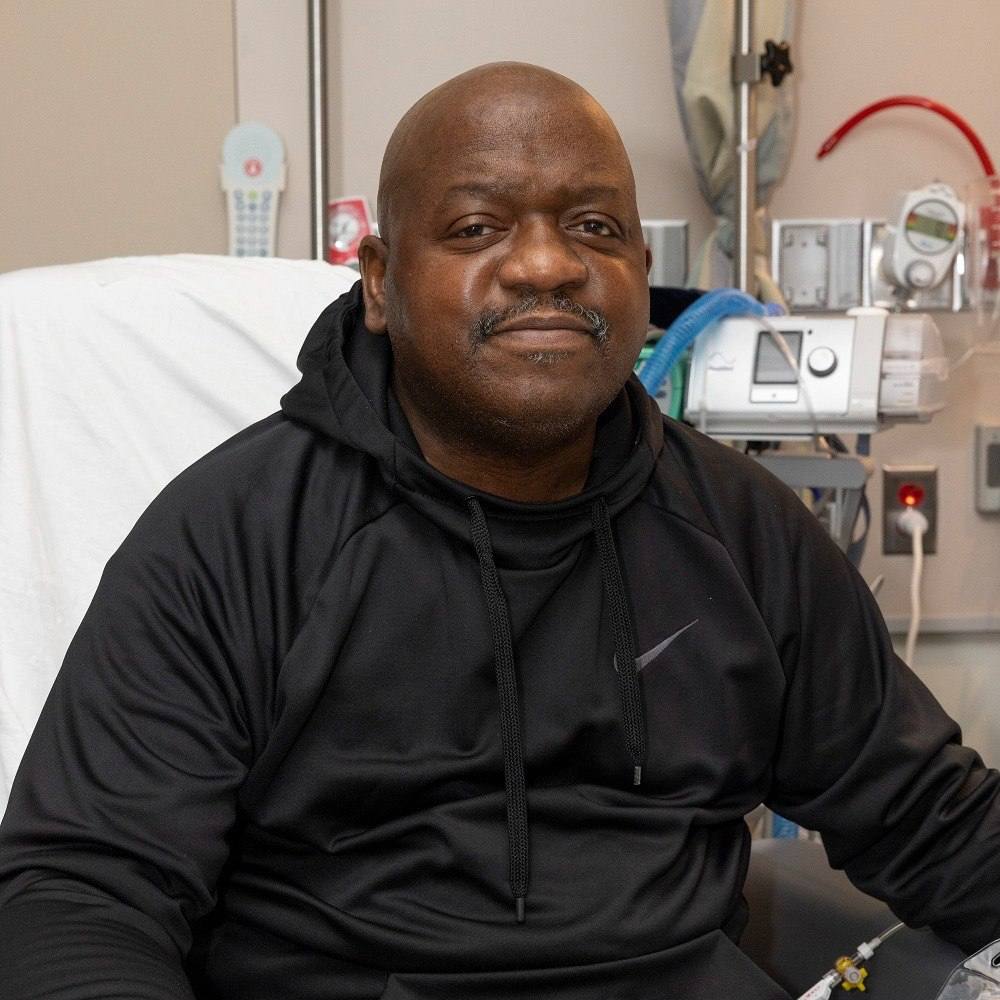Rick Slayman, the first person ever to get a pig kidney transplant that was genetically edited, was discharged from the hospital on Wednesday, April 3, 2024.

Massachusetts General Hospital said he’s recovering nicely and will continue to rest at home. The hospital wrote on X, “He is recovering well and will continue to recuperate at home with his family.”
Doctors performed the first-ever transplant of a genetically modified kidney from a pig into a living human on Thursday, March 21, 2024. Here’s what we know.
Rick Slayman Speaks on His Transplanted Pig Kidney
Rick Slayman, who got the genetically edited pig kidney transplant, said in a statement that leaving the hospital with a clean bill of health is like a dream come true.

“This moment leaving the hospital today with one of the cleanest bills of health I’ve had in a long time,” Slayman said. “It is one I wished would come for many years. Now, it’s a reality and one of the happiest moments of my life.”
Rick Slayman, 62, who works as a manager with the Massachusetts Department of Transportation, was diagnosed with end-stage kidney disease last year. He said his doctors suggested that he give a pig kidney a shot. And now, after the transplant, he’s feeling so much better.
ALSO READ: 22-Year-Old Man Who Vaped Heavily Gets Double Lung Transplant
Doctors Assert SlayMan’s New Kidney Would Last Years
Slayman’s doctors have assured his new pig kidney could last for years. However, they admitted that there are a lot of unknowns when it comes to animal-to-human transplants.

“I am firmly convinced that xenotransplantation represents a promising solution to the organ shortage crisis,” said Leonardo V Riella, MGH’s medical director for kidney transplantation, who oversaw Slayman’s procedure.
“Although much work remains undone,” David Klassen, the chief medical officer of the United Network for Organ Sharing (UNOS), a non-profit organization that runs a national transplant system with the US federal government, told Al Jazeera.
“This is a major symbolic event for the entire transplant community that represents a real possibility of xenotransplantation, one day benefitting a large number of patients.” He added that this could begin to bridge “the gap between the need for organ transplantation and several organs available for transplantation.”
Notably, Rick Slayman was the third human to undergo this type of transplant. However, the first two were with pig hearts, and they were done on patients who didn’t have any other transplant options left.
Unfortunately, both of those patients passed away a few weeks after the surgery. Slayman said he was grateful for the response to his surgery, especially from other patients who are waiting for a kidney transplant.
POLL—Should Abortion Be Legal in Most Cases?
The Success of Slayman’s Transplant Might Mark a New Beginning for Waiting Patients
The demand for organs is way higher than what’s available. Every single day, 17 people in the United States die while waiting for an organ transplant, according to sources. This is why advancements like these pig organ transplants came into existence.
Kidneys are reportedly the most in-demand organs. In 2023, around 27,000 kidneys were transplanted. However, nearly 89,000 people were on the waitlist for organs. Rick Slayman said in his statement that this is like a fresh start, not just for him but for those involved.
“I want to thank anyone who has seen my story and sent well wishes, especially patients waiting for a kidney transplant,” said Slayman. “Today marks a new beginning not just for me but for them, as well.”
How Did Slayman’s Pig Kidney Transplant Go?
Rick Slayman had a condition called end-stage renal disease, which means his kidneys couldn’t work properly. From 2011 to 2018, he had to go through dialysis. But in 2018, he got his first kidney transplant from a human donor at MGH.

After about five years, Slayman’s then-new kidney started acting up and showing signs of failure. He had to go back to dialysis in May 2023, and that brought along lots of complications. He had to go to the hospital regularly for de-clotting and surgical revisions.
The “gene-edited” pig kidney was provided by eGenesis, a biotechnology company in Cambridge, Massachusetts, that develops human-compatible engineered organs. The company used genetic editing to remove harmful pig DNA from the pig donor and added human DNA to make the kidney more compatible with the human body.
Although the procedure reportedly took about five hours, Rick Slayman was able to head back home just two weeks after the surgery.
ALSO READ: Kentucky Woman Loses All Four Limbs After Kidney Stone Surgery
Would Interspecies Organs Become the Norm?
More research is needed before we can have pig or other animal organ transplants everywhere. An American, David Bennett, got a gene-edited pig heart in January 2022, which seemed to work fine in his body. Unfortunately, in March 2022, he passed away, and the cause of death remains unknown.
In September 2023, Lawrence Faucette became the second person in the US to get a genetically modified pig heart. But six weeks later, he also passed away. The University of Maryland Medical Center, where the transplant happened, said that the heart started showing signs of rejection.
In September 2023, surgeons at New York University Langone Health conducted this experiment with a gene-edited pig kidney. The kidney worked inside the body of a brain-dead human. “There is a risk of rejection for all organ transplants,” Klassen, the UNOS chief medical officer, said.
Klassen explained that rejection is pretty common with transplanted organs. However, they can usually treat it by adjusting the medications that help with the transplant. Klassen said, “The recent xenotransplants have shown that scientists and researchers have been able to overcome the immediate rejection risk with genetically modified porcine organs.”
“But there is still much left to do before it could become widely available, such as clinical trials that replicate this in a large number of patients and the study of long-term outcomes,” Klassen concluded.
You Might Also Like:
Authorities Discover Two Bodies, Arrest Four in Connection to Missing Kansas Women
Diddy Federal Probe Documentary in the Works as Companies Scramble to Produce Detailed Film
Polls Show RFK Jr. Could Threaten Biden in Key Battleground States
Suspect Kills Two Officers Investigating Suspicious Vehicle in New York
Anna Paquin Returns to Red Carpet at NYC Movie Premiere With Walking Cane
